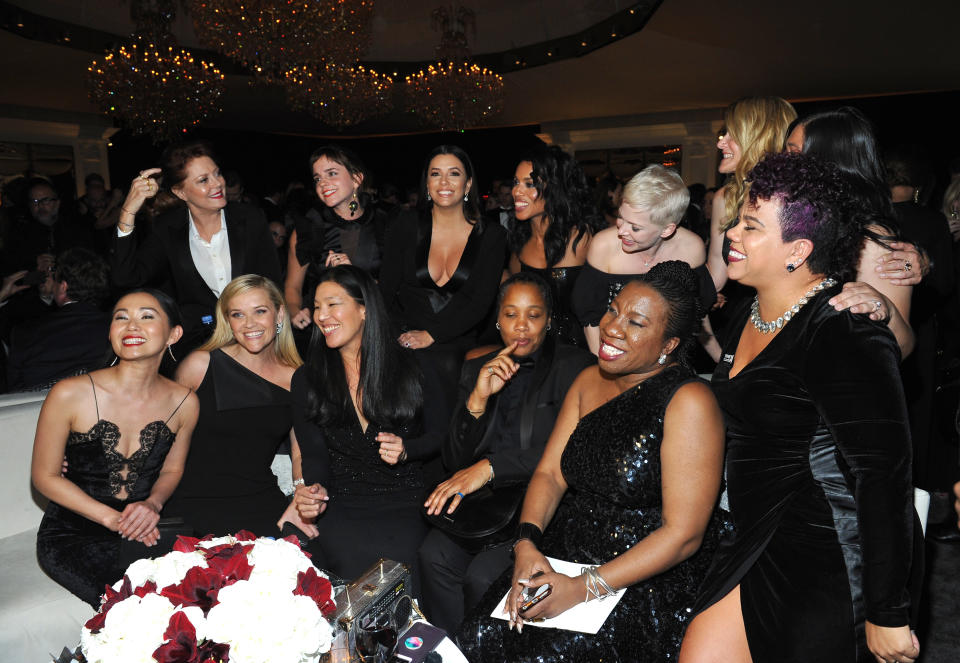Did black gowns at the Golden Globes actually matter?

On Sunday night, the mood of the 2018 Golden Globes was decidedly somber. Television and film stars strolled along the red carpet wearing the symbolic color of mourning. Time’s Up, the nascent activist arm of Hollywood, organized the parade of black clothing in order to protest the all-too-painful realities of today’s Me Too movement.
Protest wear has history, and it’s been used as a way of collectively organizing a group through a visual symbol: the nude body paint of the Slut Walk, the white suffragette garb of the 1900s, Black Panther uniforms, black “Silence=Death” shirts of AIDS activists, and the bright pink pussy hats of the the 2017 Women’s March. Time and again, protest wear has been the domain of the most marginalized — women, people of color, the LGBT community — because it is up to those groups to fight for their own equality.
On Sunday night, the women of Hollywood elevated fashion-as-protest to a place worthy of its influence in our culture. To use fashion as a means to protest these very real inequities and issues of sexual violence is itself a statement: It says that fashion, too, has undeniable power — despite the fact that in our culture, we treat fashion as a frivolity, a form of art not placed on a pedestal like visual art, theater, architecture, or design. It’s one of the very few women-dominated industries, and its feminization is the source of its position as a cultural punch line: pretty things for pretty people.
And yet the black gowns served as a visual amplification for the fights that have been taking place all along. They helped women control the narrative for the evening — but only to a certain point. That reality is what made the evening’s hypocrisies even more uncomfortable.

The Golden Globes’ top honors, for example, went to two actors who have been accused of their own abusive behavior: James Franco, who allegedly had been caught chatting with teenage girls online (he called it “bad judgment”), and who received applause from most of the house, including some actresses dressed in black, as seen in the video; and Gary Oldman. Oldman has been accused of domestic abuse: In 2001, his then-wife said that Oldman assaulted her with a telephone in front of their two children, according to court filings. He called the accusations “replete with lies, innuendoes, and half-truths.”
When Nicole Kidman accepted her award for Best Actress in a Limited Series for Big Little Lies, she said that her character in the show “represents something that is the center of our conversation right now: abuse.” The irony of her statement juxtaposed with Oldman’s win, despite his alleged history, diminishes the impact of Hollywood having credibility on the subject.
From an optics perspective, it’s a sad footnote to the very important work that Time’s Up is doing, given that no one in the organization had a hand in giving honors to Oldman. But they applauded him nonetheless.
The women in the entertainment industry who choose to tackle the issues head-on and use their fame to amplify other voices are inevitably going to mess up. One of them may say the wrong thing. Despite Time’s Up’s best intentions, wearing black gowns is not going to end workplace harassment immediately, and it isn’t even clear if the women’s united activism will extend past last night’s awards ceremony. Some critics have argued that actresses who truly stand by their principles should have skipped the Golden Globes.
Still, though they could not control the conversation entirely, the women of Hollywood took back a lot of power at the ceremony, and with a huge world platform to boot.

Michelle Williams, for one, brought Me Too founder and activist Tarana Burke as her guest, allowing Burke to speak to an audience of millions. Sure, it’s a simple gesture by the star, but Burke’s voice was given the visibility it deserves through Williams’s fame and access.
So perhaps it’s not overly optimistic to assume that the women of Time’s Up are doing the best that they can. In the end, all activists are doing what they can with their means, and fancy gowns and awards shows happen to be a means for famous actresses.
That we’re talking about it today shows that it matters. What the long-term impact will be is something we’ll have to wait and see about.
Read more from Yahoo Lifestyle:
‘Be an active bystander’: Celebrities say men can do more to help women fight harassment
Why asking ‘Who are you wearing?’ on the red carpet is still relevant — even in light of Time’s Up
Follow us on Instagram, Facebook, and Twitter for nonstop inspiration delivered fresh to your feed, every day.


